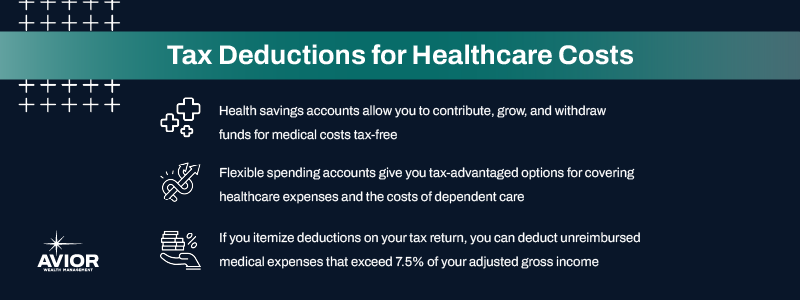Tax Deductions for Healthcare Costs
Learn how HSAs, FSAs, and healthcare cost deductions can help you cover medical expenses and lower your tax burden

The rising costs of healthcare mean that you should take all steps possible to leverage related tax deductions. Tax breaks can help you mitigate the impact of these hefty expenses.
Around half of American adults say it’s hard for them to afford healthcare costs, and the result is that many people are putting off the care they need, according to data from the Kaiser Family Foundation. In addition, about 41% of adults say they have medical debt.
Taking steps like establishing tax-advantageous accounts and understanding your tax deduction options will help you stay proactive, make more informed decisions, and maximize your tax benefits moving forward. This post helps you break down your options to better manage the financial burden of healthcare costs.
Understanding health savings accounts
One common option for healthcare-related tax advantages is a health savings account (HSA). Here are the basics of these accounts:
- Purpose: HSAs help you save for future medical expenses in a tax-advantaged account, allowing you to save for costs that aren’t covered by your current health plan.
- Eligibility criteria: You must have a high-deductible health plan, have no additional coverage (including Medicare), and not be someone else’s dependent. High-deductible health plans are those with lower premiums but higher deductibles when compared to other insurance coverage options. Your deductible must be a minimum of $1,600 as an individual or $3,200 for families to open an HSA. Your plan’s out-of-pocket maximum can’t be more than $8,050 as well.
- Tax advantages: Contributions to HSAs aren’t taxed and are also tax deductible from income. Anything accruing in the account is not subject to tax. Distributions are also tax-free as long as you use the funds for qualified medical costs.
- Contribution limits: For 2024, the limit for individuals is $4,150. This limit includes both your and your employer’s contributions. If you’re 55 or older, you can also make a catch-up contribution of $1,000 on top of the annual limit.
Aside from all the tax perks of HSAs, you can also invest what you save in your account, which gives you the potential for greater returns and growth. Note that if you exceed the contribution limit for your HSA, you’ll have to pay a 6% tax, and you won’t be able to deduct your contributions.
Understanding flexible spending accounts
Another common medical savings option is a flexible spending account (FSA). There are two types to know: health FSAs, which cover healthcare expenses for you and eligible dependents, and dependent care FSAs, which cover expenses specifically for a dependent. Here are a few FSA basics:
- Purpose: You contribute part of your income to health-related savings to help you cover medical expenses. Your employer can also contribute, but they don’t have to.
- Eligibility criteria: Most people are eligible if they’re full-time employees and receive health insurance through their employer.
- Tax advantages: Contributions to your FSA and withdrawals aren’t taxed. Because you make pre-tax contributions, your taxable income is lowered.
- Contribution limits: For 2024, the contribution limit is $3,200 for medical expenses FSAs and $5,000 for dependent care FSAs. If your employer contributes, your limits aren’t impacted.
Not all medical expenses are covered by FSAs, like general health services and cosmetic surgeries, and you cannot use funds for your health insurance premiums. In addition, you have a time limit on when you must use funds, such as within the current plan year, or you risk losing what you saved. Some employers allow carry-over amounts or grace periods, however.
Note that standard FSAs can’t be used alongside HSAs, but something called a limited-purpose flexible spending arrangement can be.
Deducting medical expenses
When filing your taxes, you either take the standard deduction or itemize your deductions. When you itemize, you may be able to deduct certain medical expenses to lower your income and thus your tax liability.
You can deduct medical expenses when they are more than 7.5% of your adjusted gross income (AGI), and you can only deduct a portion of your costs over this amount. You can only deduct these expenses when you itemize your deductions.
Types of deductible medical expenses include:
- COVID-19-related costs
- Preventative care
- Treatment and surgery
- Dental and vision care
- Mental health care, including psychologist or psychiatrist treatment
- Prescription costs
- Travel costs related to medical care
- Required medical equipment, like glasses or hearing aids
One important note: expenses you pay for out of an HSA or FSA cannot be deducted on your tax return. The IRS already considers those funds tax-advantaged. You also cannot deduct medical costs that you have already been reimbursed for.
Calculate your total healthcare costs for the year, and figure out if they are more than 7.5% of your AGI. Deduct only the expenses over that amount on your Schedule A of Form 1040.
The premium tax credit
Another healthcare-related tax advantage to know about is the premium tax credit. This credit provides help paying for healthcare premiums when you purchase coverage through the federal Marketplace. When you enroll in a plan, you’ll learn what your potential premium tax credit will be for the year.
Your income level will determine your eligibility for this credit. Typically, you can only receive it if your income is between 100% and 400% of the federal poverty line. However, the American Rescue Plan during the pandemic expanded eligibility between 2021 and 2025, so these limits may not impact you.
If you are pursuing a Marketplace plan, review your health insurance options when signing up and talk to an insurance or tax expert when you’re not sure.
Managing healthcare costs through tax planning
Being aware of your credit and deduction options related to healthcare is the first step to managing costs. Work with a professional to maximize your tax benefits, and always keep detailed records and documentation to support your tax return claims.
Talk to an advisor at Avior when you’re ready to take advantage of these healthcare-related tax perks. Our team will advise you on the latest guidelines and help you set up a strategy to tackle your goals.
Disclaimer: Nothing contained herein should be construed as legal or tax advice. Avior and our Advisors will work with your attorney and/or tax professional to assist with your legal and tax strategies. Please consult your attorney or tax professional with specific legal and/or tax questions. Investment Management and Financial Planner are offered through Avior Wealth Management, LLC, an SEC-registered investment advisor. Past performance is not a guarantee of future results. Investments are subject to loss, including the loss of principal.
No Comments
Sorry, the comment form is closed at this time.




